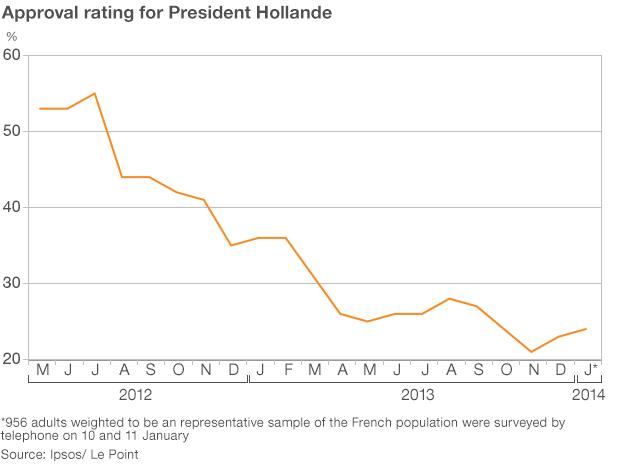Profile: Francois Hollande
- Published
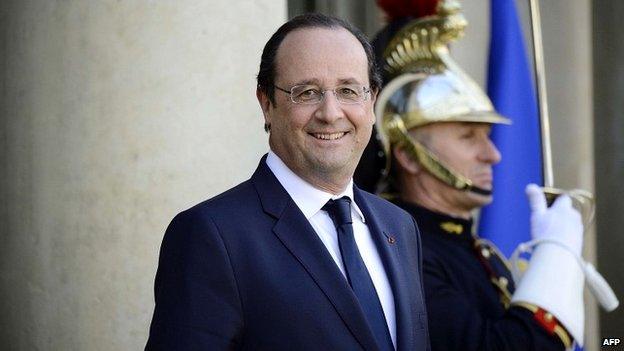
Francois Hollande has been active in socialist politics for more than 30 years
The economic woes that dominated Francois Hollande's first year as French president continued well into his second, but it was an exclusive story in a gossip magazine that caused most embarrassment for the Socialist leader.
After being besieged by record unemployment, low consumer confidence and a new recession, President Hollande would have welcomed a change in his fortunes.
But when Closer magazine published pictures purporting to show him and actress Julie Gayet arriving at a Paris flat and alleged that the pair had been having an affair, the headlines got even worse.
The story generated attention across the world but the French public appeared to have little appetite for details about their leader's love life.
Indeed, one opinion poll even suggested that news of his second affair had provided him with a three-point boost in his approval rating among women.
But with unemployment continuing to rise, Mr Hollande's personal troubles could not distract him from the reality that he had become the country's least popular president of modern times.
Party career
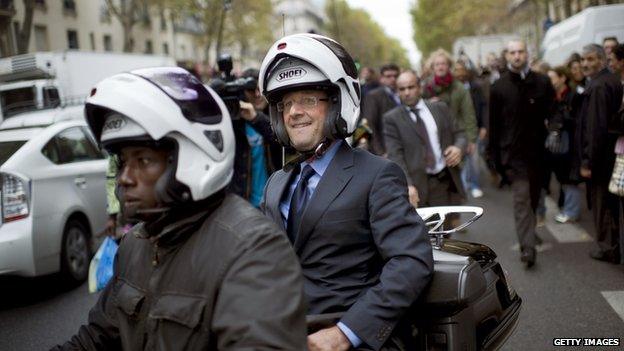
Francois Hollande campaigned by scooter in 2011
Mr Hollande was born the son of a doctor on 12 August 1954 in the north-western city of Rouen.
He attended Sciences Po and another elite institution, ENA, where he met Segolene Royal.
Ms Royal would go on to become his partner of nearly three decades and the mother of his four children, although the couple later split.
Having been active in student politics, Mr Hollande joined the Socialist party in 1979 and played a junior role as an economic adviser in the presidency of Francois Mitterrand.
A member of parliament since 1988, he represents a constituency in the south-central region of Correze.
He succeeded Lionel Jospin as party leader in 1997, a post he retained for more than a decade.
All the president's women
In 2008, amid acrimony over the defeat of Ms Royal by Mr Sarkozy at the previous year's presidential election, he stood down.
It later emerged he had been having an affair with Valerie Trierweiler, a political reporter with current affairs magazine Paris Match.
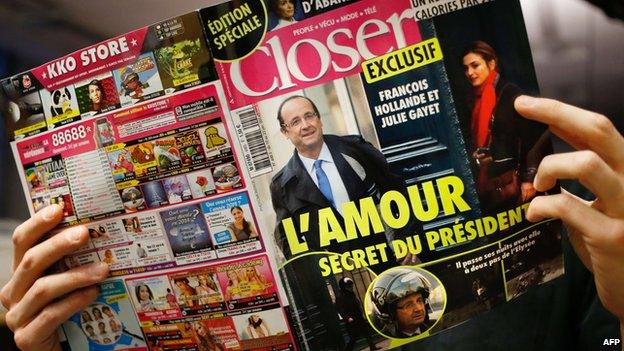
Closer magazine published claims of an affair between Mr Hollande and Ms Gayet going back two years
Ms Trierweiler moved in with the president after his official separation from Ms Royal in 2007 and followed him to the Elysee Palace when the Socialist candidate was elected president in 2012.
But the couple split after it emerged that the Mr Hollande had had another affair - this time with French actress Julie Gayet.
He confirmed their separation after Ms Trierweiler spent a week in hospital after the affair was made public in the gossip magazine Closer in January 2014.
In yet another twist, Mr Hollande chose to appoint Ms Royal to his cabinet in March 2014, making her the new minister for environment, sustainable development and energy.
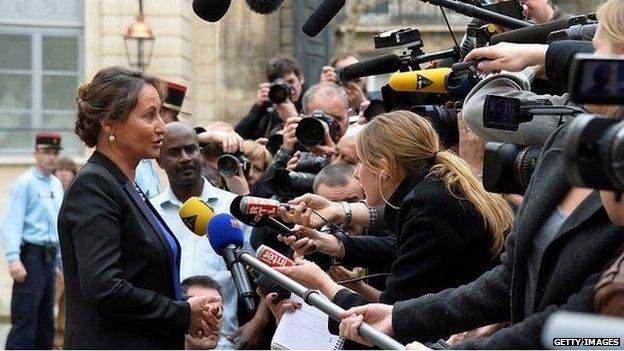
The return of Ms Royal to government followed a long period when she was out of the political spotlight
Ms Royal had apparently been blackballed by a notoriously jealous Ms Trierweiler during the selection of the president's first cabinet so it was a further sign that Mr Hollande's relationship with Ms Trierweiler was dead and buried.
'Painful'
Ms Royal's stunning comeback came after the Socialists were left badly bruised by big local election losses and bleak economic data at the end of March.
The humiliating poll results, which saw big gains for conservatives and the far-right National Front (FN), forced the president into his first major reshuffle.
In a short televised address after the elections, Mr Hollande vowed to lead a "fighting government" and said it was "time for a new direction".
But further humiliation followed in May's European Parliament election, when the FN stormed to victory and pushed Mr Hollande's Socialists into third place.
The French president described the results, which left his party with its lowest ever score, as "painful" and called for renewed EU focus on economic growth.
Indeed correspondents say his presidency now depends on the economy.
In August, he was forced to name a new cabinet under Prime Minister Manual Valls after dropping three ministers who rebelled against austerity cuts.
And in November, he admitted he had made mistakes since taking office but vowed to go "to the end" with changes.
He said he would not seek re-election in 2017 if he failed to cut unemployment.
As his approval rating dropped to an all-time-low of 12%, Mr Hollande was left struggling to both boost his popularity and push forward with reforms that have so far failed to bear fruit.
